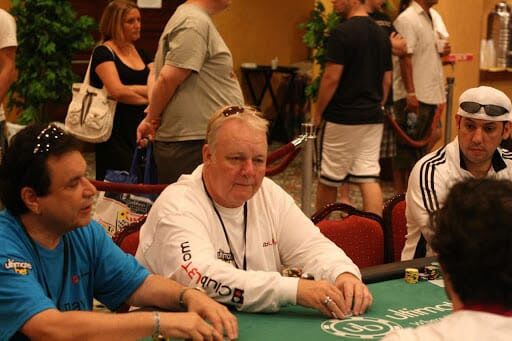Ali Imsirovic released a YouTube video last week to "dot the i's on online poker cheating". I shared some of my thoughts on this video on Twitter, after which I received the traditional question: “Why are we ready to condemn Ali, but forgive Justin Bonomo without any problems?”
I made the mistake of responding to a comment with a long tweet, not very thoughtful and not very well worded, in which I tried to explain why Justin's transgression of almost 20 years ago is a childish prank even compared to what Ali admitted to without saying already about what he is accused of.
It’s a pity, of course, that I didn’t spend a little more time substantiating my position, but what’s done is done.
What Justin Bonomo did ~17yrs ago was nothing like what Jake and Ali did. This is true even if he'd done it in 2023, but when accounting for the landscape: It's like your grandpa being sexist in the 60s vs. you committing sexual assault today.
(I know this is an odd and kind of ironic metaphor because Justin wouldn't have been sexist in the 60s but I couldn't think of a better one)
Unfortunately, I often see people with little knowledge of 2000s online poker misinterpret Justin's violation. Often the same people believe that there are thousands of people like Jake and Ali in modern poker, which means that they have not done anything particularly wrong. This is also infinitely far from the truth.
Justin Bonomo and many other players of that era thought they just found a good way to increase their downloads. Tournaments with multi-entry did not yet exist, so they came up with the idea of entering from several accounts. Remember that there were fewer tournaments back then, so MTT specialists added additional $100 and $200 tournaments this way. The fields were so huge that it was almost impossible to get at the same table with another nickname. I don’t call what Justin did right and ethical, but still his goal was simply to increase downloads, and not to gain an unfair advantage. (Yes, today we know that the extra multiple entries is also an advantage, but it is incomparable with a teamplay.) Ali, despite his youth, could not help but know that regular playing from several accounts at the same table (!) guarantees him an advantage.
Unfortunately, my attempt to dedicate the conversation to really serious issues led to quite the opposite result. I don't want to talk about Justin anymore. I'm sure he's tired of being the center of attention too.
My main point is that we should not draw false parallels that divert the attention of the community away from the discussion of notorious scammers like Ali and Jake Schindler (who were banned for much the same reasons).
So I'm going to talk about what's really important: why we should judge Jake and Ali's transgressions much more severely. I'll try to explain why their fraud is so significant.
Subtleties
In such stories, they are of great importance – just as in jurisprudence. There are petty crimes and there are serious crimes. Within each category, there are separate gradations of the severity of misconduct.
Also, laws can change over time. A serious crime by today's standards could very well have been a misdemeanor 15 years ago.

Why is it important? Can't we judge the cases of years past by today's laws, and poker players by the latest changes in the user agreement between the room and the player?
Of course we can. But if we agree with this position and do not delve into the subtleties, are we ready for the fact that in 15 years, when the standards of behavior have changed again, we will all be considered scumbags?
The use of VPNs is against the user agreement of most poker rooms, but the players openly use them and the community does not seem to condemn them at all. Many players in the last decade have not hesitated to use HUDs in rooms where it is forbidden. Some people use simple preflop charts, although they are prohibited by the room. Others use complex charts where only simple ones are allowed or all are prohibited. Many people buy mining with a history of hands in rooms that prohibit mining in order to use it for playing or analyzing field trends. And a significant part of these people do not consider their actions unethical at all.
I suspect that in today's poker community, the use of VPNs and simple preflop charts is considered a player's sacred right and is not condemned, while the other actions I have listed are more often considered scams. However, there will certainly be many who consider acceptable everything that I have said, if not more.
Players who violate the user agreement do so for the sake of additional EV. It doesn't matter if you think their actions are moral or immoral, they take away EV from those who do not cheat. Rooms can subject any of the violators to a showy reprisal, banning him by confiscating his bankroll in order to intimidate the rest. And there are people who believe that this is how it should be done. After all, purely technically, all violators of the user agreement are criminals. Just like criminals, all those who throw garbage outside the bin or accelerate to 57 miles per hour where the speed limit is 50 miles.
That is why – to avoid absurd situations – I have always been against including conditions in the user agreement that cannot be monitored. Such clauses of the contract do not lead to anything good and only harm honest people.
If you think even one of the above violations is acceptable, then you don't believe that the line between moral and immoral is exactly the letter of the law or getting extra expectations from the game.
So where does this borderline get crossed for you?
Ali at the center of the scandal.
Ali admitted to playing with multiple accounts in small field, high-buy-in tournaments. He did not specify how many accounts he used in the 30-man tournaments, but I would venture to guess that there were more than two.
He admitted that he used RTA – Real Time Computer Assistance. Recognized the use of preflop charts – "everyone does it." I spent a lot of time arguing that computer tips in such tournaments do not help much.
Even if he didn’t do anything else wrong, what he confessed to is already very, very serious and can give a great advantage.

In the hypothetical examples I described above, people could break the rules, sincerely not believing that by doing so they were taking away EV from their rivals. I do not agree with their arguments, but I would not immediately call them untrustworthy crooks, ready to do anything to gain an advantage. However, when it comes to several accounts at one table of an expensive MTT for several dozen people, additional information about the cards that came out and chip dumping leaves no doubt – Ali knew that he was openly stealing from his opponents. This alone allows him to be classified as a malicious cheater, who, moreover, does not show the slightest remorse.
This is where the key difference lies. Ali Imsirovic is a scammer who knows he is scamming, not just an ill-informed or self-deceived person. This is a villain in the same category as Russ Hamilton, Michael Postle, and so on. This is the top league of poker villainy.

Note that the charges against Ali (and Jake) are much broader than what Ali admits to in his video.
If it could be proven, I would bet serious money on the fact that Ali does not finish speaking, but this is not particularly important – you can give him a moral assessment in this way.

I would like him to tell the whole truth one day, especially about how exactly he did all this so that we can prepare and more effectively protect ourselves from his followers. Unfortunately, I don't think he'd go for it just out of the goodness of his heart. Although I really hope I'm wrong.











